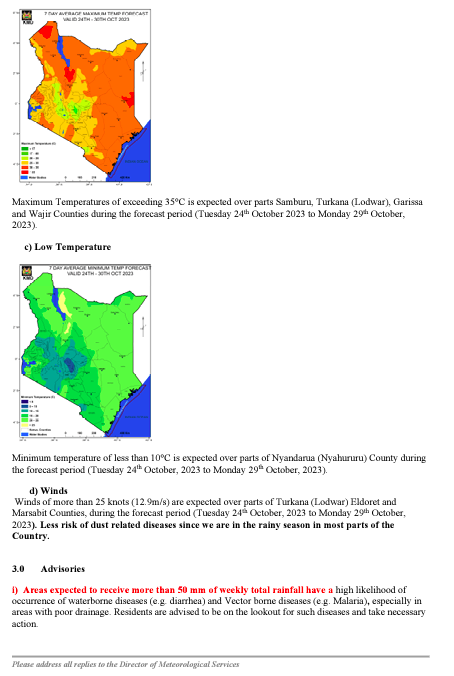Introduction
Weather influences many aspects of our daily lives, from the clothes we wear to the activities we engage in. However, the connection between weather and our health often goes overlooked. In Kenya, the Kenya Meteorological Department, in collaboration with the Ministry of Health and health sectors, has embarked on a groundbreaking initiative to bridge this gap by delving into the world of Biometeorology. This pioneering approach aims to provide valuable insights and advisories to enhance the public’s awareness of the impact of weather on their health. In this blog, we’ll take a closer look at Kenya’s Biometeorological program, its significance, and how you can benefit from their weekly Biometeorological bulletins.



What is Biometeorology?
Biometeorology is a multidisciplinary field that focuses on the relationship between atmospheric conditions and living organisms, including humans. It examines how weather and climate variables, such as temperature, humidity, and air pressure, can affect our health and well-being. Understanding these connections can lead to more informed decisions and improved public health outcomes.
Kenya’s Unique Approach
The Kenya Meteorological Department’s Biometeorological initiative is a remarkable collaboration between meteorologists and the health sector. This unique partnership harnesses the power of weather data to provide insightful advisories and promote public health. Let’s explore the key components of this approach:
- Data Integration: The initiative combines meteorological data with health-related information to create a comprehensive picture of how weather impacts health. This integration enables the development of tailored advisories and forecasts that can help individuals and healthcare professionals prepare for weather-related health challenges.
- Weekly Biometeorological Bulletin: One of the highlights of this program is the weekly Biometeorological bulletin. This bulletin provides up-to-date information on how weather conditions can influence various health factors. These insights are essential for anyone looking to proactively manage their well-being, especially in regions where weather extremes are common.
- Collaboration with the Ministry of Health: The Kenya Meteorological Department’s partnership with the Ministry of Health is crucial. It ensures that the advisories and information provided are aligned with national health priorities and strategies. This collaborative effort helps in responding effectively to health issues triggered or exacerbated by weather conditions.
Significance of Biometeorology
Understanding the relationship between weather and health can lead to a multitude of benefits for individuals and communities:
- Improved Preparedness: By staying informed about the impact of weather on health, individuals can better prepare for adverse conditions. This includes taking appropriate measures during extreme temperatures, heavy rains, or heatwaves.
- Healthcare Planning: Healthcare providers can use Biometeorological data to anticipate surges in weather-related health conditions. This information enables better allocation of resources and proactive healthcare planning.
- Public Awareness: The dissemination of Biometeorological information through weekly bulletins and other channels helps educate the public about potential health risks associated with weather. This empowers individuals to make informed decisions to protect their well-being.
- Policy Development: Biometeorological insights can inform the development of policies and guidelines that focus on climate adaptation and public health. These policies are essential in a world where climate change is becoming increasingly impactful.
How to Benefit from Biometeorological Insights
Accessing the valuable information provided by the Kenya Meteorological Department is easy and beneficial:
- Download the Weekly Bulletin: Visit meteo.go.ke/forecast/biome to download the weekly Biometeorological bulletin. This valuable resource provides the latest insights on the intersection of weather and health in Kenya.
- Stay Informed: Make it a habit to stay informed about upcoming weather conditions and their potential health impacts. Whether you’re an individual or a healthcare professional, this information can help you make better decisions.
- Share Knowledge: Encourage your friends, family, and community to take advantage of Biometeorological information. Raising awareness about the connection between weather and health is a collective effort that benefits everyone.
Conclusion
The Kenya Meteorological Department’s pioneering approach to Biometeorology is a testament to the power of collaboration and innovation. By combining weather and health data, this initiative offers invaluable insights to the public, healthcare professionals, and policymakers. As climate change continues to influence our environment, understanding how weather affects our health is becoming increasingly important. So, stay informed, stay healthy, and discover the fascinating world of Biometeorology with the Kenya Meteorological Department’s weekly Biometeorological bulletin.